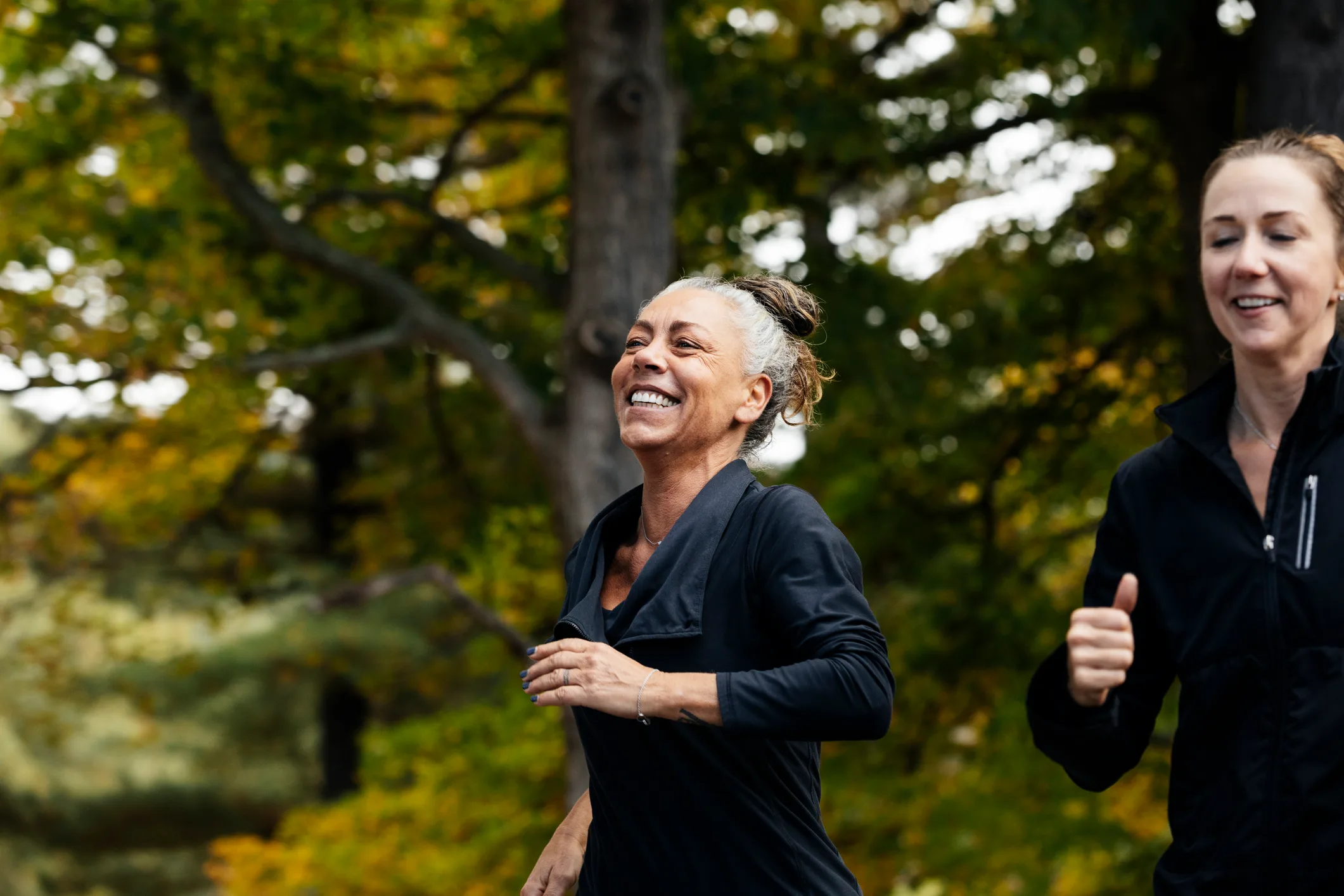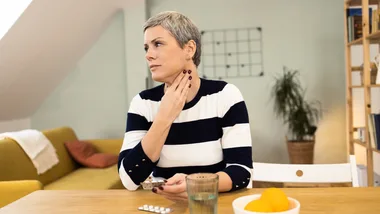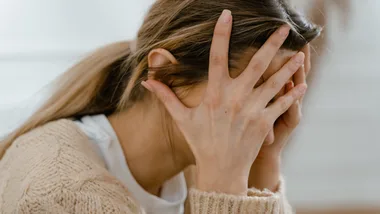Anxiety is the most common mental health issue today, affecting one in six Australians of all ages. A little bit is good for us – it keeps us alert and is a performance motivator – but too much can be bad for both our physical and mental health. “Anxiety becomes a problem when it prevents us from stepping fully into relationships, our work lives and the things that bring us joy,” says Diane.
Wondering how to deal with anxiety? Working out what triggers your anxiety symptoms is a good start when it comes to managing anxiety. “Is it when confronting work issues, family events or something else? Keep a journal so it becomes more obvious,” says Diane. “It’s also important to look at your lifestyle. I often hear clients say, ‘I don’t drink every day’, yet when delving deeper with them, I find the consumption is quite extreme when they do drink.”
What does anxiety feel like?
From headaches to nausea and chest pain, anxiety symptoms can make you feel physically unwell. “Anxious thoughts are threat-focused,” says Dr Julie Smith, clinical psychologist and author of Why Has Nobody Told Me This Before. “When we spend time with them, they feed back to your body and brain to ramp up the threat response.” That’s well and good when there’s a real threat – we are, after all, equipped with this prehistoric internal warning system to save us from imminent danger – but it’s another thing entirely when that survival response is constantly triggered by false alarms.
“Raised cortisol levels can lead to chronic conditions such as inflammation in the body, psychiatric disorders, osteoporosis, diabetes and insulin resistance, increased blood pressure and even menstruation and ovulation problems,” says Diane Young, Psychotherapist, Trauma and Addiction Specialist at South Pacific Private hospital. “There is a connection between our mental state and our physical body, so constant surges of cortisol will inevitably lead to long-term physical health problems.”
Is anxiety contagious?
You can ‘catch’ stress (as mammals, we are wired to be empathetic) but you can’t pick up anxiety like a cold or flu. Anxiety is a result of how well we are able to deal with the stressors we face. Michael Hawton, registered psychologist and author of The Anxiety Coach says this is an observable pattern in school children who co-ruminate. “Kids get in the playground together and belly ache about the teachers and the conversation goes down and down. Too much empathy without any problem solving means they can get themselves into a discourse that actually creates sadness. ”
According to Michael, around 30 per cent of children with anxiety are born with an anxious temperament but for the majority it is a learned behaviour (so it can be unlearned too). “More kids now are talking and behaving anxiously than a generation ago. “Anxiety is a normal part of being human but we need to give kids the skills to be the boss of their anxiety. The earlier you intervene, the better the outcome.”
How to deal with anxiety symptoms
As well as working on your physical health, Dr Smith recommends creating distance between yourself and anxious thoughts. “If I was coaching a friend through this, what would I say and how would I say it?” she suggests asking yourself.
Psychiatrist Dr Lisa Myers recommends actively reframing. “Try to find a positive so you are flipping the narrative in your brain from what can go wrong to the possible benefits the situation could bring.” While it takes both grit and support, facing your anxiety head-on can yield the biggest benefit in the long term. “Challenge your anxieties,” says Dr Myers. “The best way to overcome your fears is to show yourself that you can face whatever is holding you back.”
Here are six simple techniques you can deploy to help manage the symptoms of anxiety.
1. Try meditating
“Mindfulness practice, with a focus on breathing or a mantra, can give you some much needed peace of mind, but it is only temporary because the cause of your anxiety will be there when you finish meditating,” explains stress management expert Luke McLeod from Soul Alive, a virtual meditation studio. “That’s when a second type of meditation can help, one in which you invite what is making you anxious to the surface to actively process it. It can be difficult and emotional but will help immensely with reducing the amount of anxiety you experience on a day-to-day basis.” Luke suggests exercising or deep breathing before meditating. “This removes the anxious jitters from the body so your mind is going to find it easier to relax.”

2. Do a digital detox
“There have been many studies on this and there is no doubt, particularly for mums and young grans, we are living in a competitive culture,” says Diane. “I’m a gran myself, and I certainly feel the pressure! The fear and anxiety of not living up to others’ expectations can leave us feeling defeated. Why not take a break from social media and notice whether or not you feel differently?” It can help to set time limits to avoid falling down the social media rabbit hole and triggering anxiety symptoms.
3. Have a regular massage
There is scientific evidence that therapeutic massage reduces cortisol levels according to Saila Insua Lopez, Physiotherapist at Wonder A Way of Being in Double Bay. “Massage is one of the oldest therapeutic tools that humans have that can stimulate the function of the vagus nerve,” says Saila. “When the vagus nerve works properly it helps to keep anxiety under control as we can stay calm. If its function is disturbed it can lead to psychological issues and physical problems such as headaches, digestive problems, high blood pressure and swallowing difficulties.” If you’re looking for a DIY option at home Saila recommends regularly massaging the diaphragm and abdomen in a clockwise motion as the vagus nerve controls these areas.
4. Focus on your gut health
“There is a link between gut and mental health,” says Andrea Zapantis, founder and lead nutritionist at KYH Nutrition. “The food we eat is our fuel and it is what builds or breaks down our bodies. Reduced levels of Omega 3 fatty acid and magnesium are strongly linked with anxiety and depression. Magnesium plays a role in the production of melatonin and serotonin, which helps to boost your sleep and mood. Omega 3 helps to reduce inflammation in our bodies nervous system and improves brain function and cognitive health.” Include plenty of brown rice, green leafy vegetables and legumes in your diet for magnesium and salmon, flaxseed and chia seeds for Omega 3.
5. Get more exercise
Research shows exercise is a great distraction and can improve your ability to cope with stress. “Exercise increases the production of endorphins, which enhance feelings of wellbeing, and also serotonin and dopamine, which help regulate mood,” says Ben Lucas from Flow Athletic. “By working through physical challenges you can also learn to overcome obstacles and develop a greater sense of control over your body and emotions. This can help you feel more empowered to manage anxiety in other areas of your life.” If your anxiety symptom includes heart-racing, Ben suggests doing a calming exercise, such as yoga, hiking or walking in nature. If anxiety is causing feelings of anger, try running or HIIT followed by a slow stretch, meditation and deep breathing.

6. Try deep breathing
According to breathwork specialist Rory Warnock, breathing techniques can down-regulate your autonomic nervous system into a parasympathetic state, which helps you to feel calmer and more relaxed. “One of the beauties of breathwork is that no one even knows you’re doing it,” says Rory. “It’s a technique you can use reactively in times of stress, whether on the commute or in the office.” Rory recommends the 4:6 breathing technique: inhale for four seconds and exhale for 6 seconds. “It’s incredibly simple but extremely effective. The long exhale will help move the autonomic nervous system into a more calming state.” Rory recommends practising the 4:6 breathing technique for between 3-10 minutes to quell anxious feelings.
The information in this article is of a general nature. For specific health conditions or before altering your diet see your doctor or health professional.










